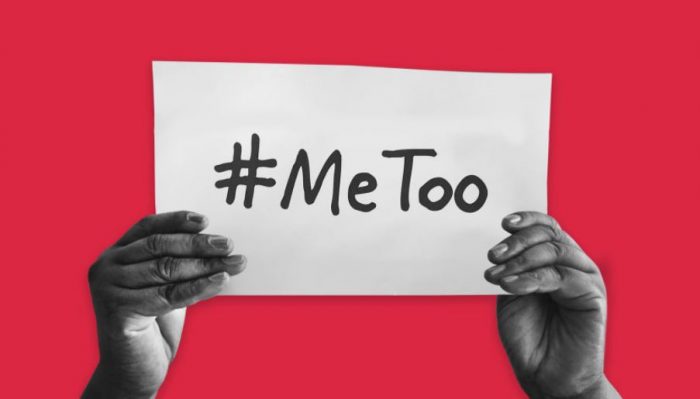The Minister has spoken about her #metoo. Yes, in 2004 it was the two female ministers who did a #metoo when they thought that Mrs Sonia Gandhi might become the prime minister of the country. Ms Sushma Swaraj and Ms Uma Bharati threatened that if that happen that they would live like ‘widows’ by shaving their head and doing so many other things ‘prescribed’ for the widows. Fortunately, they did not have to do so as Sonia Gandhi refused to become prime minister.
Second time Ms Swaraj spoke of ‘passionately’ in Parliament was during the debate related to Nirbhaya case. She was full of ‘anger’ and termed Nirbhaya as ‘jinda laash’. That time she was still alive. The connotations were clear that a woman who is violated become ‘jinda laash’, a dead one.
Today Ms Swaraj is the Minister for External Affairs and under her was another Minister, a very ‘famous’ editor and author who was charged by many colleagues as sexual predator but she refused to speak on the issue or take a stand. For long, Ms Swaraj has been seen in TV studios on the Karwa chauth day or Teej and celebrating with the ‘suhagans’, a symbol she never refuses to flaunt. In the brahmanical set up, a woman is ’empowered’ and ‘respected’ as long as she is ‘sugahan’ and our ministers deliberately portray that.
Ms Swaraj has truely got a new competitor in Ms Smriti Irani whose life story is ‘inspiring’. Ms Irani follows the same traits and flaunt ‘married woman status’ as the Sangh Parivar would wish her to do in the greater interest of ‘protecting’ bhartiyata where a woman is allowed to ‘work’ or go out but at the same point of time need to protect our ‘sanskriti’ and ‘family’. The first duty of a woman is to protect her family and ‘sanskriti’.
For last few days, we have witnessed women fighting for the rights of entry at the Sabarimala temple. Women above 10 and below 50 are not allowed to enter Sabarimala temple. The reasons are clear. They menstruate and it is considered ‘dirty’ in all religious practices. The Kanya pujan during navratris have the same argument when you worship the girl child but not while she become a woman. It happen in Nepal’s famous ‘Kumari’, the living Goddess who is worshipped as long as she does not have menses. In many Dargah, women are not allowed to enter the sanctum sanctorum if they are menstruating. Mrs Irani says that a mother of two Zoroastrian boys, she cant go to the fire temple because women are not allowed historically and she ‘respect’ the tradition.
Though, my position is that a religion is not a religion if change. Religion are not here to change. They remain caged in the old traditional practices dictated and dominated by the powerful clique in every religion. Women are just the ‘career’ of these practices and traditions that humiliate them. Hence Sushama, Smriti and many others like them only play that role which keep the brahmanical patriarchy happy as they hail from those organisations. Now, to justify her position on not allowing Sabarimala temple, she bring the Zoroastrian women’s issue but it is true that you can’t liberate women through religious sanctity. Even when the entry of women in Haji Ali Dargah came, many women rose against it though today, they can easily enter the sanctum sanctorum of the Dargah.
Problem is not that Smiriti Irani can’t have her views and good that both Irani and Swaraj have proved that mere being woman does not guarantee that you would stand for their rights even when they should know that their current position in the party is due to the constitutional guarantee of one woman equal to one man and not due to their ‘religious’ morality which never ever gave women equal rights.
Smriti Irani said,“I am nobody to speak on the Supreme Court verdict because I am a current serving Cabinet Minister. But just plain common sense. Would you take sanitary napkins steeped in menstrual blood and walk into a friend’s home? You will not. And do you think that it is respectful to do the same when you walk into the house of God? So that is the difference. I have a right to pray. I do not have the right to desecrate. That is my personal opinion’.
Whatever be her personal opinion but she had actually re-enforced the age old belief that ‘women are dirty when they menstruate’. It is due to this belief many women in our villages are still kept in gaushalas and not allowed to sleep in their houses during the periods. It is this belief that they cant go to Hanuman temples on tuesdays if they are on their periods. It is this belief which make them feel shame on themselves. I dont know how can the Ministers attend the important cabinet meet if they feel it is dirty and women should not go to a ‘ friend’s’ place.
India’s Metoo movement has to address these issues which are very serious in nature. The whisper in the offices and among the colleagues if they realise women menses is simply shameful to say the least. The need of the hour is not to bring merely the old stories or name calling which at the end will not take us anywhere but based on these experiences create a better environment. It cant be a war between men and women. It will have to jolt our value system which is feudal and patriarchal. The brahmanical patriarchy in India is not merely a powerful instrument to suppress India’s Bahujan masses culturally but also use the savarna women to divert the real issues of caste discrimination and the institutional violence that Bahujan samaj including its women faces on a daily basis in India.
Metoo will succeed if the women’s movement understand and accept the institution of brahmanical monopoly on our culture and institutional oppression of the communities through its rigid cultural practices in the name of tradition. If we are able to understand it and see that women do not become part of a brahmanical propaganda machinery to justify caste violence or divert the issues of institutional discrimination, then we have to work to change our social environment and ensure both our offices as well as our public transport and social platform remain thoroughly democratised and respect right to consent as well as right to dissent.
No movement should result in creating an environment detrimental for freedom but mostly the twitter ‘revolutions’ world over have actually resulted in worse situations than the previous one. Egypt, Tunisia, Turkey, India and elsewhere we have seen how social media is used effectively more by the religious rights and occupy the space taking a ‘moral’ high ground. We know what happened to Anna’s anti corruption movement in India and who benefitted from it. When the khap panchayats were killing Dalits just for their falling in love with the girls from caste Hindu families, we did not have a strong voice. We did not have a campaign of that intensity which could jolt the brahmanical discriminatory mindset. Now, many of the activists are suggesting that people should not fall in love. They should not love boys and girls beyond their castes and these voices are coming from the sections who are worried about their innocent youngs being killed. Will Metoo also result in the same. When the atmosphere become so tense and superficial and confine to a few individual stories then the larger part disappear. Based on these narratives people come to the conclusion that every other person is bad. A country like India will have worst repercussion on it. People wont allow their girls to move out. Many places might not give them employment. Parents would only justify caste marriages even when we know that violence happens with in the family too but then as I said, right wing narrative become more acceptable than the ‘modern’ narrative. Those who have raised the issues are well equipped people. They can live life at their own. They are well connected and in the media but for millions of those who have to seek permission from their parents, brothers, husbands or even society, things are not that easy. Things dont change overnight. We all have a duty to create a better environment which could be not only be left to ‘law enforcing agencies’ but also by building up confidence and awareness about changing environment. Hundreds of new issues will be developed to deny women freedom and equality and it is therefore more important for all of us to work for a better future and not falling into the trap of the past. World has changed and so men and women too need to change which would be impossible without challenging the social cultural practices norms as well as institution of caste.
Vidya Bhushan Rawat
October 24th, 2018









